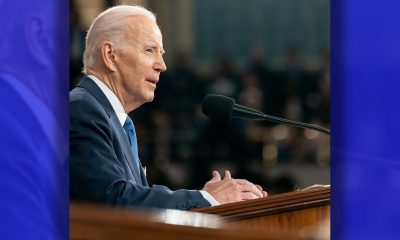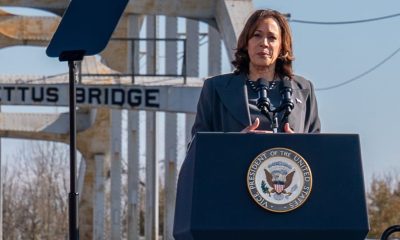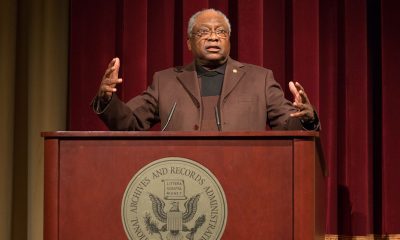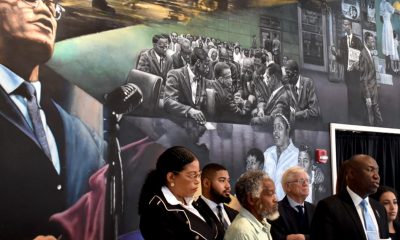Defender News Network
Rev. Christopher Johnson: Millennial ministers speak out in honor of Dr. King
DEFENDER NEWS NETWORK — The Defender sought out four millennial members of the clergy to get their take on the big issues of the day
Dr. Martin Luther King Jr. began his socially conscious ministry at 26, an age we now consider a millennial. With that in mind, the Defender sought out four millennial members of the clergy to get their take on the big issues of the day, and how those issues impact how they do ministry.
Rev. Christopher Johnson with Good Hope Missionary Baptist Church shares his thoughts.
Defender: What are the challenges unique to a young minister?
Christopher Johnson: There are many challenges that are unique to the young millennial minister but there are three that immediately come to mind.
The first unique challenge is how to communicate God’s eternal truth to this generation. The millennial generation has been bombarded with countless research-driven surveys that criticizes and labels them. After reading these assessments a person might think that there is no hope for our generation. God’s plan of salvation is the same for this generation as it was for those before them. How does the 21stcentury young preacher communicate God’s truth in their own unique way? A way of communication that their generation can relate to so that they can be all that God would have them be?
The second unique challenge is, will the young millennial preacher actually make an attempt to live out the very Gospel that they preach? In a time where social media is so vital how do we as ministers balance our personal and public lives? We must be committed to transparency and accountability.
The third unique challenge is how do we identify and meet the needs of God’s people in 2019? What worked 20-30 years ago will not work today. Are we willing to be creative and innovative not only in our stratagems but also in our thinking and approach? People are looking for a real and authentic encounter with not only God but with His people as well. What does that look like in the 21stcentury? These are only a few unique challenges that come to mind.
Defender: What are the opportunities unique to a young minister?
Johnson: In my humble opinion the young minister has the unique opportunity to serve people faster and more efficiently than ever before. Social media has given ministries and ministers the opportunity to get information in and out quicker. Technology allows us to gather data, process it and come up with prayerful evidence based solutions. Another opportunity that we have as young ministers is the ability to speak to our culture and influence it. I believe that people are hungry for God’s truth and His way of living. God’s truth leads to the betterment of His people. The end result is always the glory of God being manifested in the life of His people. Because of technology, we no longer have to wait until Sunday or Wednesday to touch the community. We can do it in a matter of minutes. We are able to connect quicker than ever before. Because we are at the dawn of the new technological age the church as to be ahead of the curve instead of behind it (technologically speaking)
Defender: How do politics and social issues (police brutality, Black Lives Matter, immigration reform, #Me-too, LGBTQ issues, healthcare access, etc.) frame and/or impact your approach to ministry?
Johnson: In addition to teaching/preaching the word, the job of the Pastor/Preacher is to serve the people. The word Pastor means shepherd. The image of the shepherd and sheep is an important one. In the time of the Bible the primary job of the shepherd was to take care of their flock of sheep. This means that they had to be intimately familiar with the needs of the flock. They also had to be just as familiar with the needs and potential dangers and threats to the flock as well. The shepherd is placed over a flock (people/community/congregation) for their holistic guidance according to God’s truth. Our job is to know what affects the people so that we can prayerfully, lovingly, and strategically guide our people through those issues. All of the aforementioned issues are very important in our lifetime. The Pastor must be sensitive yet strategic when addressing these issues. I’m really concerned and passionate about all of the issues mentioned above. Because we are all created in God’s image, we all are entitled to our God-given right of life, liberty and the pursuit of happiness (as long as it’s aligned with God’s plan for our life). One of the biggest strengths of the African-American church has been the ability and willingness to speak truth to power. The Black Pastor/Preacher must begin to speak truth to power again. That truth must to be told in a spiritually and culturally unapologetic way. I think these issues must be on the agenda for the Pastor/Preacher/Church to address from the perspective of God’s word.
Defender: What is the biggest (most important) political issue impacting the U.S. and/or members of your congregation? That’s difficult to say.
Johnson: I serve under Dr. D.Z. Cofield, senior Pastor of Good Hope Missionary Baptist Church in Third Ward Houston, Texas. We see and are engaged in so many political issues that impact our community and congregation. If I had to choose one it would have to be police brutality/community violence. I believe that we have to expand our definition of police brutality. Police brutality is not only the physical attack by Law enforcement on people of color. Police brutality is also when Law enforcement refuses to police minority neighborhoods in a way that is fair and addresses the criminal element in that community.
On the south side of Houston, we are in the midst of the worst pandemic of community violence this city has seen in almost 40 years. When I listen to residents there is the belief that police just don’t care. There are many residents that believe the biggest form of police brutality is the absence of police protection in their communities.
Defender: What are your thoughts and positions on the current president, his administration and his policies?
Johnson: President Trump is who he said he would be. My concern is not only his xenophobic rhetoric but also the large population of White-Americans who support his race-baiting and fear-mongering. Our white brothers and sisters can no longer claim ignorance of racism and intolerance as an excuse. Unfortunately, 55 years after the March on Washington and the Voting Acts Bill being passed, we are dangerously close to going back to a time where civil and human rights mean nothing. What makes President Trump most unsettling is the lethal triadic combination of ignorance, arrogance, and white-entitlement. His policies only speak to a segment of people who want to see people of color only as second class citizens. His lack of care and concern for the environment is evident with his stance on coal, the Keystone Pipeline and climate change. His withdrawal of Troops in Syria has only weakened us on the world stage. I believe that his presidency is meant to be a wake-up call to those of us who say we are change agents for our generation.
Defender: How big or small a role does your blackness (Black history, pride and heritage) and attacks upon your blackness (white supremacy/racism) have in your approach to ministry?
Johnson: One of the ways the Gospel is told is through the context of culture. There is no dichotomy in my spirituality and my culture. By definition, Christianity is a North African spiritual practice. The handprint of African people and its diaspora is all over Christianity. We have to teach our people how to find our contributions to Christianity. In regards to America’s Christianity, I quote the words of Fredrick Douglass “I am against the Christianity of America but me love, practice and follow the Christianity of Jesus Christ”. When we read the writings of our ancestors like Fredrick Douglass, Reverend JWC Pennington (Pastor of the Amistad slaves), Phillis Wheatley, James Gronniosaw, John Marrant, and others it gives me hope. They were attacked more harshly than we are being attacked now. However, they all endured and persevered because of their faith and trust in God. The black church was birthed in pain but it has progressed because of it. I realize that as we struggle, God struggles with us. Jesus tells us that because we follow Him we will be persecuted. The same sticks used to attack us are only logs that fuel our fire for God and His ministry here on earth. Our history has proven our people are strong mentally, emotionally, spiritually, and physically. Our blackness uniquely gives us an insight and perspective that otherwise I don’t think we would have. Because of our struggles past, present, and future Black people in this America know God in a way that is unique all unto itself.
Defender: For Rev. Dr. MLK Jr., a young minister who became a pastor at 26, fighting for civil rights and later economic equality were big drivers of his ministry. Is there one or two political or social or cultural issues that drive your ministry?
Johnson: Socially it would be Community Violence and Community Restoration with an emphasis on Human, Civil, and Community Rights. Politically it would be voter suppression, with an emphasis on voter awareness and registration.
Defender: How do you balance commitment to your ministry with parenting?
Johnson: It is difficult. I have an 8yr old son his name is Christopher Johnson II. I am constantly working be a better Father in all aspects. I’m constantly reminded that He is my first ministry commitment.
Defender: With society in general becoming less religious (less committed to a particular denomination; less committed to one specific church home; etc.), how does this impact your ministry?
Johnson: I believe this is a great opportunity. A recent Barna survey revealed that most Americans across racial and ethnic lines consider themselves spiritual and not religious. I think that there is a great desire and need that many people have to know God personally. Personally, I’m always interested in talking and listening to people and finding out why people are less committed to one specific church home or why there is a shift in society toward God or the church. The main job of any pastor/teacher is to equip his/her congregation for the work of God in their daily lives. If there’s no congregation to equip then in my mind the question is where are the people; what are they being equipped with and for; and who’s equipping them. I think these issues provide us the opportunity to engage people in a meaningful way.
Defender: How do you respond to the criticisms many millennials voice about religion in general, and the Christian church in particular? (i.e. it is anti-intellectual; often treats women like second class citizens; ignores or downplays culture and social issues, etc.)
Johnson: I would first by saying that many of these criticisms of religion and some churches are true. I am an older millennial myself. I didn’t grow up in the church like some of my friends. I had to learn that the church is not a perfect place. The people in the church are not perfect people. They are fragile, flawed, deficient, hurt, and in the process of becoming just like everyone else. I was in the music industry for thirteen years. I worked for some of the most successful music CEO’s in the business. I managed some of the biggest artists in the world at that time. When I left that culture and came to God, the church was (and still is) a culture shock. The talk is different. The lifestyle is different. America has commercialized the church to look like a place where everything is perfect. Sadly that’s not the case because the church is not a perfect place. God is perfect. Jesus Christ is perfect. People are not perfect. We are an imperfect people in the processing of being perfected by a perfect God. People are the total sum of their experiences. Some people have been to churches and have not had good experiences and for that I am truly sorry for them. The majority of people go to church looking for an authentic worship experience and to encounter with God. Every church isn’t bad, nor is every church sexist, or anti-intellectual, and not every church is behind the curve socially and politically.
One of the biggest criticisms that my friends have of the church is that it feels like a business. By that they mean that they don’t feel any level of connectivity with the people, pastor or worship experience. One friend shared with me that after growing up in church all her life she just didn’t feel as if her place of worship was authentic enough. She said it was the same old routine. There was no passion in the worship service she said. Basically she felt as if the mood of the worship environment was manufactured and not authentic. Another friend told me that his issue was the lack of political and social activity. He was upset because of what he perceived to be the unwillingness of some black churches and Pastors to speak out regarding the shooting of unarmed black men. Another friend was upset about the lack of cultural recognition in black churches. She felt that the form of Christianity practiced in most black churches has been whitewashed. All of these are important issues. I believe God has earmarked this generation to be change agents in their communities, churches, workplaces, and families. My response is to listen carefully when I have these conversations and ask questions. The Church has to begin to listen to what the younger generation says it needs spiritually, relationally, emotionally, socially, politically, and economically. When those things begin to happen I believe that there will be a change in the attitude of some toward the church.
This article originally appeared in the Defender News Network.
#NNPA BlackPress
Philadelphia honors Patti LaBelle with a street – but spells her name wrong
DEFENDER NEWS NETWORK — Philadelphia honored singer Patti LaBelle with her very own street earlier this week. Unfortunately, the signs didn’t get her name right. The city’s Streets Department didn’t capitalize the “b″ in the legendary soul singer’s last name on the signs that were put up before Tuesday’s ceremony on Broad Street. A stretch between Locust and Spruce streets was renamed “Patti LaBelle Way” in honor of the Philadelphia native.
By Defender News Service
Philadelphia honored singer Patti LaBelle with her very own street earlier this week. Unfortunately, the signs didn’t get her name right.
The city’s Streets Department didn’t capitalize the “b″ in the legendary soul singer’s last name on the signs that were put up before Tuesday’s ceremony on Broad Street. A stretch between Locust and Spruce streets was renamed “Patti LaBelle Way” in honor of the Philadelphia native.
City spokeswoman Deana Gamble tells The Philadelphia Inquirer the city is aware of the error and plans to install signs with the correct capitalization next week.
A sign that LaBelle autographed and held during the ceremony had the correct spelling.
She thanked all the fans who came out to the ceremony and reminisced about her parents walking down that very stretch of Broad Street.
This article originally appeared in the Defender News Network.
#NNPA BlackPress
Lee Daniels to briefly resurrect his cancelled ‘Star’ drama series
DEFENDER NEWS NETWORK — Following news that the Fox Network cancelled the music drama Star after three seasons, comes word from producer Lee Daniels that the series will be making a comeback as a televised movie.
By Defender News Service
Following news that the Fox Network cancelled the music drama Star after three seasons, comes word from producer Lee Daniels that the series will be making a comeback as a televised movie.
“The bad news is that ‘Star’ is not getting picked up for series,” Daniels says in an Instagram video post recently, which he captioned “Get ready for a two-hour gag!!”
In the clip, he calls the circumstances surrounding the cancellation “too long of a story to cry about.”
“The good news is: we’re doing a movie of the week to wrap things up for you all,” he says.
As was previously announced, fans were rocked by the news of the Empire spin-off getting the ax, especially seeing as how the season three finale ended on a jaw-dropping cliffhanger. The last episode aired Wednesday (May 8), just two days before the cancellation announcement.
At the time, Daniels said he was attempting to shop the series to other networks, but his efforts proved fruitless, as noted by TheWrap. Now the Oscar nominee vows to “make something real special for you to scream about with all of our cast members, even the dead ones.”
Daniels did not say when or on which network the two-hour Star movie will air, although it’s being assumed that the tele-film will be on Fox, which is also wrapping up Daniels’ Empire musical drama series next year. Reps for the network have not yet responded to requests for comment about Star’s resurgence.
The Atlanta-based Star follows the journey of three young women who form a musical group and navigate the ruthless business on their way to success. The cast features Jude Demorest, Ryan Destiny. Brittany O’Grady, Queen Latifah and Benjamin Bratt.
The sitcom averaged 3.5 million viewers for Season 3, compared to Season 2’s 4.1 mill, and hit a series low as recently as May 1, according to TVLine.
This article originally appeared in the Defender News Network.
Defender News Network
With conflicting budget estimates, will Texas teachers get the pay raises they anticipated?
DEFENDER NEWS NETWORK — When state lawmakers passed their landmark $11.6 billion school finance law in late May, school employees were eager to see how mandatory raises would affect their paychecks. A month later, they’re scratching their heads, struggling to decipher complicated changes and conflicting financial estimates that might not net teachers as much money as they expected.
By Defender News Service
When state lawmakers passed their landmark $11.6 billion school finance law in late May, school employees were eager to see how mandatory raises would affect their paychecks.
A month later, they’re scratching their heads, struggling to decipher complicated changes and conflicting financial estimates that might not net teachers as much money as they expected.
Before lawmakers voted nearly unanimously to approve House Bill 3, which drastically overhauled Texas’ outdated school funding system, they received estimates from the state on how much additional money each of their school districts would likely receive over the next two years. But the estimates came with a warning: They could change significantly once the calculations were performed using local data.
Ahead of the upcoming school year, districts are now redoing those calculations themselves — and some are coming up short. That could pose a problem for teachers, nurses, counselors and librarians, since under HB 3, school districts are supposed to use a portion of the new money on those employees’ raises and benefits. (School boards must approve their budgets by either a June 30 or an Aug. 31 deadline.)
Georgetown ISD, for example, is projecting $5.9 million in new money in the upcoming school year, much less than the $10.3 million state estimate. And it will shell out about $9 million in recapture payments, which the state takes from wealthier districts to subsidize poorer ones — not the $3.5 million the state estimated in May.
Cypress-Fairbanks ISD, a large suburban district in the Houston area, should’ve expected $30 million more in the upcoming school year, according to the state estimates. But school board members approved a budget in late June that projected just $14 million more, according to Karen Smith, the district’s chief financial officer.
To remain competitive as employers, both districts are going beyond the state’s requirement to use 30% of the new money to increase salaries and benefits. Georgetown ISD is including $3,000 raises for teachers, counselors, librarians and nurses with more than five years of experience. Cypress-Fairbanks ISD approved a budget millions of dollars in the red that includes $25.4 million in raises for classroom teachers, librarians, counselors and nurses and $10.8 million in raises for all other employees.
Teacher pay raises quickly became a bipartisan rallying cry during the 2019 legislative session that finished up in May. But instead of the statewide $5,000 raise many teachers advocated for from the get-go, lawmakers approved a set of guidelines for salary bumps that would end up leaving the dollar amounts largely up to district leaders.
There is not yet an official statewide summary on what compensation packages look like across school districts, but eventually districts will be required to report that information to the Legislature. Meanwhile, the state has been providing guidance on how to interpret the new law through videos and PowerPoint presentations.
Without an across-the-board pay raise mandate from the state, teachers and other school employees have been looking left and right at neighboring school districts to judge how they’re going to fare. Some report having heard nothing from their school districts so far this summer, as they anxiously monitor the news from across the state.
Sunnyvale ISD Superintendent Doug Williams found that the state’s calculation for how much more his tiny school district would receive was pretty accurate: just under $600,000. But school districts in the vicinity, which include large, urban Dallas ISD, are getting millions more, meaning they’ll be required to offer bigger raises.
To stay competitive, Sunnyvale ISD’s school board approved larger pay raises than required by law, ranging from $1,800 for beginning teachers to $2,700 for the most experienced. “We have been blessed to be able to attract and retain great teachers,” Williams said. “We just want to make sure we are able to continue.”
In some school districts, local teachers’ unions and associations are butting heads with administrators as they advocate for higher raises and larger employer contributions to health insurance. After adopting a budget with 5% raises, Laredo ISD’s officials told frustrated teachers they are waiting for more guidance from the state before they consider raising salaries further.
In Houston ISD, the teachers union successfully threatened a no-confidence vote against the superintendent if trustees didn’t pass a budget with pay raises by later this month, arguing the delay would make them less competitive for hiring. After a contentious meeting, the board ultimately approved a deficit budget containing raises of 3.5% to 8%, depending on school employees’ experience levels. The budget also increased the minimum wage for school employees by $2 an hour.
For third grade writing teacher Huyenchau Vu, who watched the Legislature’s initial proposal for $5,000 raises dissolve, a 3.5% raise means a boost of less than $2,000 a year and less than $100 per paycheck. “It goes back into paying for everything, not necessarily into a savings account,” said Vu, who just finished teaching summer school at Houston ISD and will start her third year teaching in August.
She and her colleagues have been taking notes about the higher starting salaries and raises for Houston-area districts such as Aldine ISD and Alief ISD, but not necessarily because they’re trying to jump ship. While Vu would appreciate more money, she is also worried about the sustainability of the Legislature’s funding increase and is glad Houston ISD appears to be more “realistic” in its budgeting decisions than its neighbors.
“They’re paying their teachers a lot more knowing it’s just over the next two years that we’re receiving money from the state of Texas to put into these teacher salaries,” she said. “After that, no one’s sure what’s going to happen.”
This article originally appeared in the Defender News Network.
-

 Activism4 weeks ago
Activism4 weeks agoOakland Post: Week of March 27 – April 2, 2024
-

 #NNPA BlackPress4 weeks ago
#NNPA BlackPress4 weeks agoCOMMENTARY: D.C. Crime Bill Fails to Address Root Causes of Violence and Incarceration
-

 #NNPA BlackPress4 weeks ago
#NNPA BlackPress4 weeks agoMayor, City Council President React to May 31 Closing of Birmingham-Southern College
-

 #NNPA BlackPress4 weeks ago
#NNPA BlackPress4 weeks agoBeloved Actor and Activist Louis Cameron Gossett Jr. Dies at 87
-

 Community1 week ago
Community1 week agoFinancial Assistance Bill for Descendants of Enslaved Persons to Help Them Purchase, Own, or Maintain a Home
-

 Activism3 weeks ago
Activism3 weeks agoOakland Post: Week of April 3 – 6, 2024
-

 Business1 week ago
Business1 week agoV.P. Kamala Harris: Americans With Criminal Records Will Soon Be Eligible for SBA Loans
-

 Activism2 weeks ago
Activism2 weeks agoOakland Post: Week of April 10 – 16, 2024
























































